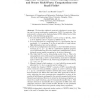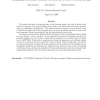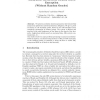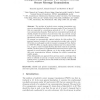130
Voted
CRYPTO
2006
Springer
15 years 4 months ago
2006
Springer
Abstract. We introduce algebraic geometric techniques in secret sharing and in secure multi-party computation (MPC) in particular. The main result is a linear secret sharing scheme...
74
Voted
CRYPTO
2006
Springer
15 years 4 months ago
2006
Springer
105
click to vote
CRYPTO
2006
Springer
15 years 4 months ago
2006
Springer
In a traditional signature scheme, a signature on a message m is issued under a public key PK, and can be interpreted as follows: "The owner of the public key PK and its corr...
111
click to vote
CRYPTO
2006
Springer
15 years 4 months ago
2006
Springer
Abstract. One of the most basic requirements concerning Boolean functions used in cryptosystems is that they must have high algebraic degrees. This simple criterion is not always w...
110
click to vote
CRYPTO
2006
Springer
15 years 4 months ago
2006
Springer
We address the issue of encrypting data in local storage using a key that is derived from the user's password. The typical solution in use today is to derive the key from the...
103
click to vote
CRYPTO
2006
Springer
15 years 4 months ago
2006
Springer
We present an identity-based cryptosystem that features fully anonymous ciphertexts and hierarchical key delegation. We give a proof of security in the standard model, based on the...
CRYPTO
2006
Springer
15 years 4 months ago
2006
Springer
This paper presents the first automatic technique for proving not only protocols but also primitives in the exact security computational model. Automatic proofs of cryptographic pr...
107
Voted
CRYPTO
2006
Springer
15 years 4 months ago
2006
Springer
In this paper we formalize a general model of cryptanalytic time/memory tradeoffs for the inversion of a random function f : {0, 1, . . . , N - 1} {0, 1, . . . , N - 1}. The model...
104
click to vote
CRYPTO
2006
Springer
15 years 4 months ago
2006
Springer
Abstract. The problem of perfectly secure message transmission concerns two synchronized non-faulty processors sender (S) and receiver (R) that are connected by a synchronous netwo...
114
click to vote
CRYPTO
2006
Springer
15 years 4 months ago
2006
Springer
This paper considers the problem of password-authenticated key exchange (PAKE) in a client-server setting, where the server authenticates using a stored password file, and it is de...




